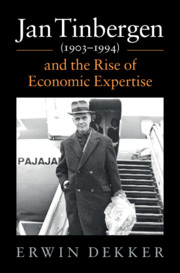Book contents
- Jan Tinbergen (1903–1994) and the Rise of Economic Expertise
- Historical Perspectives on Modern Economics
- Jan Tinbergen (1903–1994) and the Rise of Economic Expertise
- Copyright page
- Dedication
- Contents
- List of Figures/Tables
- Preface
- Acknowledgments
- Part I Becoming an Economic Expert
- Part II The Years of High Expertise
- Part III Global Expertise
- Part IV The Limits of Expertise
- 17 Measuring the Unmeasurable
- 18 Governing the Ungovernable
- 19 Expert or Idealist?
- Bibliography
- Index
- Series page
17 - Measuring the Unmeasurable
Welfare and Justice
from Part IV - The Limits of Expertise
Published online by Cambridge University Press: 11 June 2021
- Jan Tinbergen (1903–1994) and the Rise of Economic Expertise
- Historical Perspectives on Modern Economics
- Jan Tinbergen (1903–1994) and the Rise of Economic Expertise
- Copyright page
- Dedication
- Contents
- List of Figures/Tables
- Preface
- Acknowledgments
- Part I Becoming an Economic Expert
- Part II The Years of High Expertise
- Part III Global Expertise
- Part IV The Limits of Expertise
- 17 Measuring the Unmeasurable
- 18 Governing the Ungovernable
- 19 Expert or Idealist?
- Bibliography
- Index
- Series page
Summary
Chapter 17 analyzes his efforts, throughout his scientific career, to measure welfare. Measurement was crucial for his intellectual program. While measurement often succeeded in his early career with the development of business-cycle statistics, the measurement of welfare remained unattainable. The measurement of welfare was important because it would allow a scientific comparison of the welfare levels between different individuals, and thus of the degree of inequality. He wanted to use that as a basis for his scientific notion of justice. In his efforts he went against a general consensus in economics that interpersonal comparisons of welfare were beyond the reach of economic science. Tinbergen took up a chair in Leiden after his retirement and attempted to develop a collaboration with Bernard van Praag and Arie Kapteyn, but their joint approach found little support in the wider economics community. Nonetheless, the failure is interesting because it provides insight into the way in which moral concerns became more important later in Tinbergen’s career, how crucial measurement was to him, and because his attempts foreshadowed later approaches in economics to measure capabilities and happiness. Most importantly, it demonstrates how he hoped that science could inform normative concepts such as justice.
Keywords
- Type
- Chapter
- Information
- Jan Tinbergen (1903–1994) and the Rise of Economic Expertise , pp. 375 - 392Publisher: Cambridge University PressPrint publication year: 2021

